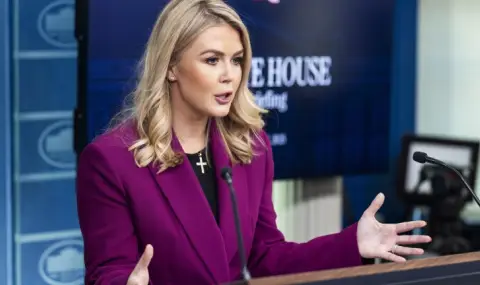Washington is fully focused on talks to resolve Ukraine, with US President Donald Trump confident the conflict can be ended this week, White House press secretary Carolyn Leavitt said on Saturday.
She added that there had been no reports yet of a possible personal meeting between Russian President Vladimir Putin and Trump.
“I don't have any details and I have nothing to say about that“, she said, responding to a request to say how soon a face-to-face meeting between Putin and Trump could take place and whether it was planned to be held in Saudi Arabia.
"Right now the president and his team are focused on continuing negotiations with both parties to this war to end the conflict. And the president is confident that we can do that this week," said the White House spokeswoman. She did not explain her latest statement. Apparently, Levitt was referring to next week. However, the press secretary did not specify what this forecast was based on.
Meanwhile, Bloomberg, citing a Ukrainian official familiar with the negotiations, wrote that Ukraine has resisted US demands for a $500 billion fund as part of a deal that would give Washington a share of the country's mineral wealth.
The fund would aim to compensate the US for aid provided to Kiev since the beginning of the war. However, Ukraine claims that the actual amount of this aid is approximately $90 billion - almost five times less than the requested amount, the source said.
Earlier, The New York Times reported that Washington's proposed terms for a new offer for Ukrainian minerals include Ukraine's refusal not only to receive half of the revenues from natural resources, but also from revenues from ports and other infrastructure. The new draft agreement also includes provisions on revenues from territories now under Russian control with the remark "in the event of their liberation". In addition, the share of revenues for the United States from resources in these territories will be 66%.
The new document says that the proceeds from the deal will be directed to a special fund in which the United States owns a 100 percent financial stake. Ukraine will have to make contributions to this fund until it reaches $500 billion.
The day before, The Wall Street Journal, citing sources, reported that Washington and Kiev could sign an agreement on the use of Ukrainian rare earth minerals as early as February 22. According to the publication, the countries are “close to a deal” on the transfer of “rights to valuable minerals” to the United States as compensation for American military aid. Rada deputy from the “European Solidarity” party Oleksiy Honcharenko subsequently announced that the agreement on the extraction of Ukrainian minerals would be signed by Ukrainian Foreign Minister Andriy Sibiga and US Secretary of State Marco Rubio. In turn, the Ukrainian publication "Obshchestvennoe", citing a source in Volodymyr Zelensky's office, reported that the signing of the agreement on February 22 will not take place.
Earlier, US President Donald Trump said that Washington and Kiev are close to signing an agreement. Speaking to reporters at the White House, he noted that "this is a big deal" and that the Ukrainians "want it". Zelensky, in a video message posted on his Telegram channel on Friday, expressed hope for a "fair outcome" on the agreement with the United States on rare earth metals in Ukraine. According to him, work on the draft document is ongoing.
In early February, Trump said that Washington is interested in receiving rare earth metals from Ukraine. On February 12, US Treasury Secretary Scott Besant handed over the text of the agreement to Zelensky in Kiev. Zelensky, who had previously expressed his readiness to conclude a deal, did not sign the agreement either during a meeting with Bessent, or later in Munich during a meeting with US Vice President J. D. Vance. Zelensky noted that there were no security guarantees in the proposed agreement. The Ukrainian delegation submitted the text with its own amendments, which the Americans in Munich did not take into account. Zelensky's refusal to sign the agreement led to a deterioration in US-Ukrainian relations.
